Did you know that altricial birds, like robins and blue jays, are born with closed eyes and no feathers? They need total care for food and warmth. On the other hand, precocial birds, such as ducks and geese, hatch with open eyes and soft feathers. They are more independent and can walk and peck at food early on.
This difference in development shows how unique their nutritional needs are. It’s fascinating to see how different birds start their lives.
Key Takeaways
- Newborn birds have specific dietary requirements based on their species and developmental stage.
- Most baby birds need high-protein diets, with frequent feedings every 15-20 minutes from sunrise to sunset.
- Parents typically provide insects, worms, and other protein-rich foods to their hatchlings.
- Emergency feeding options include moistened dog food, raw liver, and specialized commercial formulas.
- It’s crucial to avoid feeding baby birds bread, milk, and human foods with additives.
Understanding Baby Bird Development Stages
Newborn birds go through different growth stages. Each stage has its own nutritional needs. It’s important to know these stages to feed them right.
Altricial vs. Precocial Birds
Baby birds are either altricial or precocial. Altricial birds, like robins and cardinals, are born helpless. They need constant care and feeding from their parents. Precocial birds, like ducks and geese, hatch more developed. They can move and feed themselves soon after birth.
Nestlings vs. Fledglings
Nestlings are featherless, blind, and totally dependent on their parents. Fledglings have feathers and are learning to fly. But they still need their parents for food and guidance.
Age-Specific Nutritional Needs
As baby birds grow, their nutritional needs change. Protein is key in the early stages. Later, carbohydrates, fats, and other nutrients become more important. Knowing these needs is crucial for healthy growth.
| Stage | Age | Key Nutritional Needs |
|---|---|---|
| Hatchling | 0-3 days | High-protein diet, frequent feedings |
| Nestling | 3-13 days | Balanced diet with increased caloric intake |
| Fledgling | 13-14 days+ | Gradual transition to adult-like diet |
“Proper nutrition is essential for the healthy growth and development of baby birds. Failure to meet their age-specific dietary needs can have serious consequences.”
What Do Newborn Birds Eat?
Newly hatched birds, or newly hatched bird sustenance, need specific food. They rely on their parents for all their nutrition. The food they eat changes based on the bird species, but some foods are key for their growth.
Parents often bring insects, worms, and small larvae to their nestlings. For example, American robins feed their babies up to 150 times a day. Each baby robin eats its weight in insects, worms, and berries every day. Cedar waxwings start with insects but then give fruits to their young. Baby hummingbirds get a mix of nectar and small insects.
| Bird Species | Typical Newborn Diet |
|---|---|
| American Robin | Insects, worms, berries |
| Cedar Waxwing | Insects, fruits |
| Hummingbird | Nectar, small insects |
| American Goldfinch | Mashed-up seeds |
In emergencies, you can feed baby birds a mix of dog food, liver, egg yolk, and turkey baby food. You can also use commercial bird formulas. It’s important to feed them often and adjust the food based on their age and species.
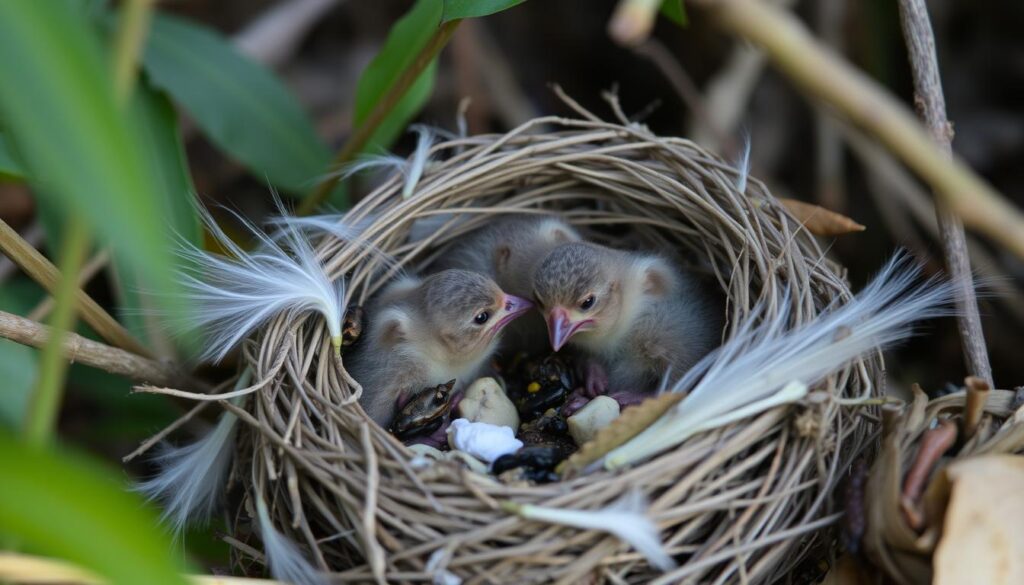
Young birds learn to find food by trying and practicing. Watching them as they start to forage can help them survive. To support them, create a bird-friendly area with native plants. Keep cats indoors and avoid using pesticides.
Natural Feeding Patterns in Wild Birds
Watching how parent birds feed in the wild teaches us a lot. It shows us what their babies need to grow and stay healthy. Parent birds follow a set routine to feed their young well.
Parent Birds’ Feeding Behavior
Parent birds are very careful about feeding their babies. They go to the nest often, from dawn to dusk. They bring insects, worms, seeds, and fruits, depending on the bird type. This ensures the babies get the food they need.
Feeding Frequency and Schedule
- Newborn baby birds need to eat every 15-20 minutes during the day.
- As they grow, they eat less often, every 30-60 minutes.
- Parent birds adjust the food amount and type based on the chicks’ age and size.
By watching how wild birds feed, we learn a lot. We see what food and how often they need it. This helps us care for baby birds that are hurt or lost their parents.
“A pair of American robins may deliver 100 to 150 meals a day to their nest of babies, and each baby robin may consume its weight in insects, worms, and berries daily.”
By watching how wild birds feed, we learn a lot. We see what food and how often they need it. This helps us care for baby birds that are hurt or lost their parents.
Essential Nutrients for Baby Bird Growth
Caring for newborn birds means knowing their special nutritional needs. These tiny hatchlings grow fast, needing proteins, fats, carbohydrates, vitamins, and minerals. The right chick food requirements and hatchling nutrition are key to their health.
Insects and larvae are very important. They give baby birds the amino acids and fats they need for growth. As they get older, their diet changes. Older chicks need more variety, like seeds and fruits for some species.
| Nutrient | Importance for Baby Birds |
|---|---|
| Protein | Needed for rapid growth, feather development, and tissue repair. Crucial at hatching and until adult size is reached. |
| Calcium | The most abundant mineral in young birds’ bodies, required in greater amounts than any other mineral. |
| Lipids (Fats) | Provide energy, essential fatty acids, and pigments that contribute to feather coloration. |
| Carotenoids | Pigments responsible for red, orange, and yellow feather colors, also crucial for breeding success. |
Understanding the essential nutrients for baby bird growth helps caregivers. They can make sure their young ones get the right hatchling nutrition and chick food requirements to grow well.
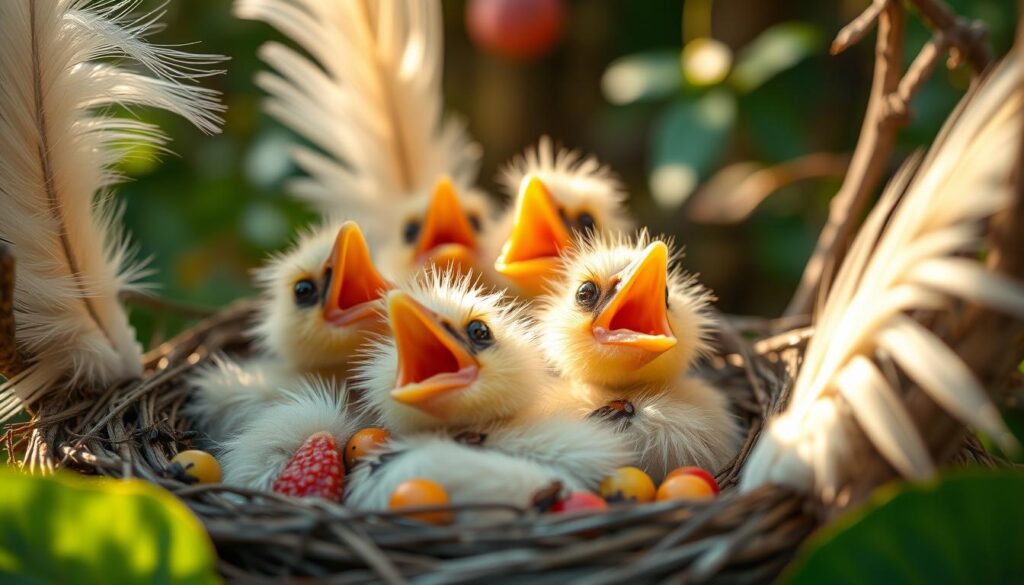
Safe and Healthy Food Options for Baby Birds
Feeding newborn birds is all about giving them a balanced diet. You can choose from protein-rich foods, safe insects, and commercial bird formulas. Each option meets the needs of different baby bird species.
Protein-Rich Foods
Baby birds need lots of protein for growth. Good sources include finely chopped hard-boiled eggs, cooked ground chicken or turkey, and unsalted nut butters. Start with small amounts to avoid stomach problems.
Insects and Larvae
In the wild, birds eat insects and larvae like mealworms, crickets, and earthworms. These foods are full of nutrients and great for baby birds. Make sure the insects are the right size to avoid choking.
Commercial Bird Formula
Many experts suggest using commercial bird formulas. They are made to give baby birds the nutrients they need. Always mix and feed these formulas as directed by the manufacturer.
| Food Item | Benefits | Precautions |
|---|---|---|
| Mealworms | High in protein and healthy fats | Ensure appropriate size to prevent choking |
| Cooked Ground Chicken | Excellent source of protein | Avoid seasoning or spices |
| Commercial Bird Formula | Nutritionally balanced for baby birds | Follow manufacturer’s instructions carefully |
Offering a variety of safe, healthy foods helps baby birds grow strong. This way, they can become healthy adults.
Foods to Avoid Feeding Baby Birds
Caring for baby birds means paying close attention to their food. It’s important to avoid giving them human foods that can harm them. Giving the wrong food can cause serious health problems.
Feeding them bread or dairy products is a big mistake. These can upset their stomachs. Also, raw meat, salty snacks, and foods with additives are bad for them. They can be toxic and upset their growing bodies.
- Bread and dairy products
- Raw meat
- Salty or processed human foods
- Honey
Don’t give nestlings direct water. It can cause them to choke. Make sure their food has the right amount of moisture.
Also, avoid giving them spoiled or moldy seeds. These can have harmful bacteria and fungi. If you’re unsure, talk to a wildlife center or vet. They can help you feed them safely and well.
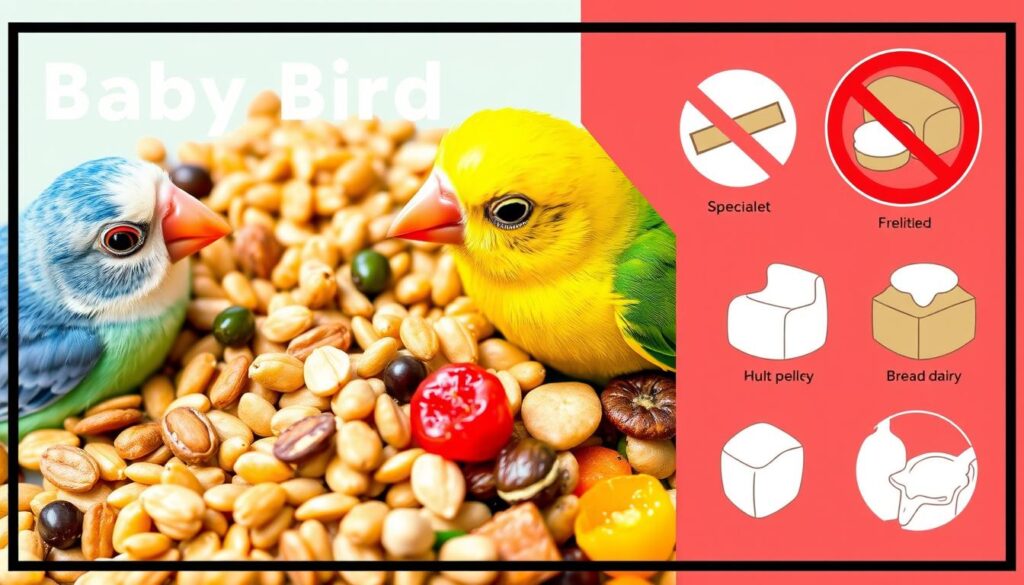
“The feeding mixture for baby birds usually consists of mynah bird pellets or dry dog food soaked in hot water, baby food, turkey, cooked egg yolk, and a bit of water, offering a varied diet to meet their nutritional needs.”
| Food to Avoid | Reason |
|---|---|
| Bread | Can cause digestive issues |
| Milk | Can lead to diarrhea and malnutrition |
| Raw Meat | Can harbor harmful bacteria |
| Salty Snacks | Can disrupt electrolyte balance |
| Honey | Can contain botulism spores |
Knowing what baby birds need to eat is key. This way, you can make sure they get the right food. This helps them grow strong and healthy.
Proper Feeding Techniques and Methods
Caring for newborn birds needs special feeding methods. These ensure their digestive systems get the right food safely. Knowing the right tools and methods is key for their growth.
Feeding Tools and Equipment
The right tools are crucial for feeding baby birds. Small syringes, tweezers, or spoons are best for feeding them. Make sure the food is at room temperature and easy for the bird to swallow.
Safety Measures During Feeding
Keeping things clean is very important when feeding baby birds. Always wash your hands and utensils before and after feeding. Don’t force the bird’s beak open or overfeed, as this can harm them.
Proper feeding techniques and methods are essential for ensuring the health and well-being of newborn birds. By using the right tools, maintaining hygiene, and following safe feeding practices, you can provide the nourishment these delicate creatures need to thrive.
Emergency Feeding Guidelines
When caring for newborn birds, emergencies can happen. It’s key to know how to feed them right to keep them alive until help comes. A good mix for emergency feeding is moistened dog food, cooked egg yolk, and baby food.
Use a small syringe or tweezers to feed this mix to the baby bird every 20 minutes from dawn to dusk. Make sure the bird stays warm and get help from a wildlife rehabber fast. Don’t give water directly; the food should be moist to keep the bird hydrated.
| Emergency Feeding Ingredients | Feeding Frequency | Consultation Recommendation |
|---|---|---|
| Moistened dog food, cooked egg yolk, baby food | Every 20 minutes from dawn to dusk | Consult a wildlife rehabilitator as soon as possible |
When a newborn bird needs emergency care, you must balance their nutrition and watch them closely. By following these steps, you can help the hatchling until they get the care they need. This ensures the best chance for the newborn bird meals and hatchling nutrition.
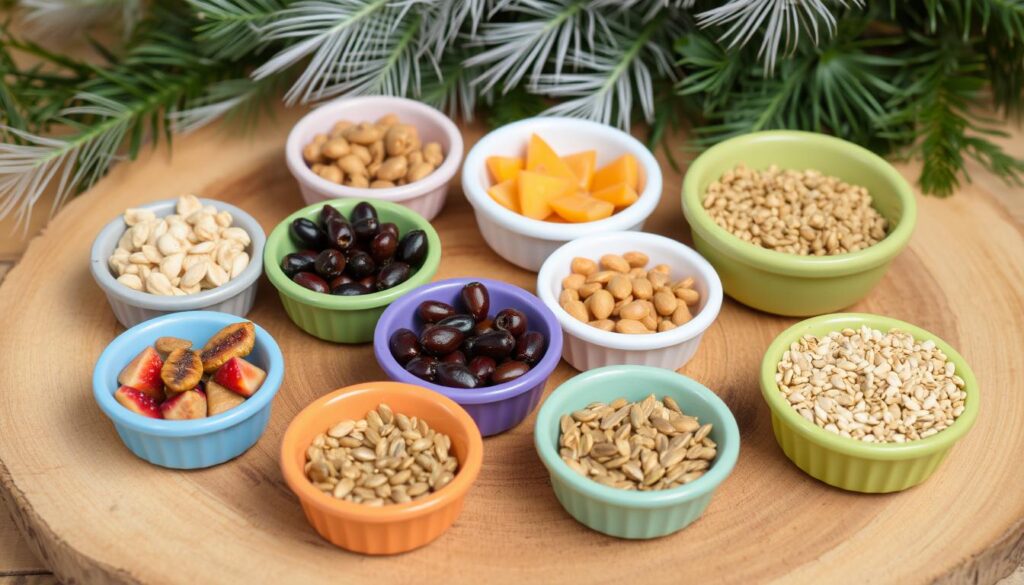
“Altricial baby birds may need to be fed every 1-2 hours when very young.”
Species-Specific Dietary Requirements
Understanding the dietary needs of baby birds is key to their health. Each bird species has its own nutritional needs for growth and development.
Songbird Diet Variations
Songbirds, like sparrows and robins, need a diet rich in insects and worms. Their parents feed them up to 150 times a day. This ensures they get the nutrients they need to grow fast.
Specialty Bird Nutrition
Some birds have special dietary needs. For example, finches and canaries need a mix of softened seeds and insects. Ducks and geese do well on aquatic insects, plants, and grains. Hawks and owls, being carnivores, need a diet of meat.
It’s vital to research the dietary needs of your baby bird. Or, talk to an avian expert to make sure they get the right food for growth.
| Bird Species | Dietary Requirements |
|---|---|
| Songbirds (Sparrows, Robins, Warblers) | High-protein diet with insects and worms |
| Seed-eating Birds (Finches, Canaries) | Balanced diet of softened seeds and insects |
| Waterfowl (Ducks, Geese) | Aquatic insects, plants, and grains |
| Raptors (Hawks, Owls) | Meat-based diet |
It’s important to find out the specific dietary needs of your baby bird. Or, get advice from an avian expert. This ensures they get the right chick food requirements and avian infant nourishment for their growth.
Signs of Proper Nutrition and Health
It’s very important to make sure your baby bird eats right and stays healthy. Birds that are well-fed grow well, act alert, and have nice feathers. Their crops should be full but not too big after eating.
Healthy chicks are always moving, making sounds, and have bright eyes. They also poop regularly and grow at a steady pace. But, if they seem tired, don’t want to eat, or have weird poop, they might be sick and need help fast.
| Healthy Baby Bird Characteristics | Potential Concerns |
|---|---|
| Steady growth | Lethargy |
| Alert behavior | Lack of appetite |
| Good feather development | Abnormal droppings |
| Full but not distended crop | Weight loss |
| Active and vocal | Dull or cloudy eyes |
| Regular defecation | Respiratory issues |
| Consistent weight gain | Digestive problems |
Watching your baby bird’s growth and health closely is key. This way, you know it’s getting the right baby bird diet and hatchling nutrition to grow strong. Talking to an avian vet can also help keep your bird happy and healthy.

Common Feeding Mistakes to Avoid
Caring for newborn birds is a delicate yet rewarding task. It’s vital to avoid common feeding mistakes that can harm their health. Each species has different feeding needs, so it’s crucial to know what your baby birds need.
One big mistake is overfeeding or underfeeding. Giving the right amount of food at the right time is key for their growth. Too much food can cause stomach problems, while not enough can stunt their growth and health.
Another mistake is using the wrong foods. Don’t give human baby formula or cow’s milk, as it can harm their stomachs. Also, giving adult bird food to nestlings can lead to nutritional problems because their needs are different.
- Don’t force-feed or give water directly, as it can cause choking and breathing issues.
- Keep a regular feeding schedule to help the baby bird grow properly.
- Always clean feeding equipment well to prevent bacteria and diseases.
By avoiding these common mistakes and knowing the specific needs of your birds, you can help them grow strong and healthy. This way, they can become vibrant adults.
“The risk to the bird of starvation is much smaller than the risk of a human trying to feed it without the necessary expertise.”
When to Seek Professional Help
Caring for baby birds needs special knowledge and skills. It’s great to want to help a helpless hatchling or fledgling. But, some situations are better left to the experts. If a baby bird seems injured, very tired, or won’t eat, you must get help right away.
Reach out to a local wildlife rehabilitator if you’re not sure about feeding or if the bird’s health gets worse. These places have the right training and tools to care for baby birds. Trying to feed or care for a baby bird without the right training can harm it and might even kill it.
| Scenario | Recommended Action |
|---|---|
| Bird appears injured or ill | Immediately contact a wildlife rehabilitator or veterinary clinic |
| Bird is lethargic or unresponsive during feeding | Seek professional help to ensure proper care and nutrition |
| Bird is an orphaned nestling | Contact a wildlife rehabilitation center for specialist care |
Proper baby bird diet and avian infant nourishment are key for healthy growth. Feeding a baby bird the wrong food or using the wrong techniques can cause serious health problems. If you’re unsure about caring for a baby bird, it’s best to get professional advice.
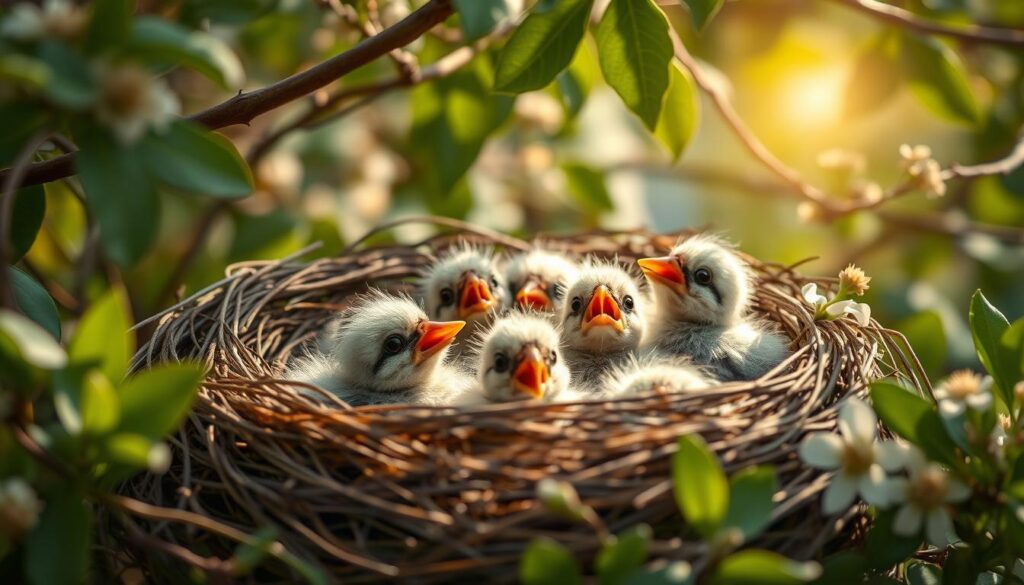
Working with experienced wildlife rehabilitators ensures the baby bird gets the care it needs. This way, it can grow strong and eventually return to the wild. Don’t be afraid to ask for professional help – it’s the best way to help that little one.
Conclusion
Caring for newborn birds requires knowing their special diet and growth stages. While we can help in emergencies, getting help from wildlife experts is best. Learning how to feed them right and knowing what they need is key to their survival.
It’s important to focus on the bird’s health and natural growth. This helps them grow strong and healthy, ready to live in the wild again.
Feeding newborn bird meals and meeting their hatchling nutrition needs is crucial. With the help of wildlife experts, we can make sure baby birds grow well. This way, they can return to their natural homes successfully.
Helping newborn birds is a rewarding task that helps protect them. By understanding their needs and following the right steps, we support bird populations. This also helps us appreciate nature more.
FAQ
What do newborn birds eat?
Newborn birds eat insects, worms, and other protein-rich foods. Their parents provide these. For emergency care, a mix of dog food, raw liver, egg yolk, and turkey baby food works. Commercial baby bird formulas are also available.
How often do parent birds feed their young?
Wild parent birds feed their young often. They do this every 15-30 minutes from dawn to dusk. They give a variety of insects, worms, and sometimes seeds or fruits, depending on the species.
What are the essential nutrients for baby bird growth?
Baby birds need high-protein diets for growth. They need proteins, fats, carbohydrates, vitamins, and minerals. Insects and larvae are key for amino acids and fats.
What are safe food options for feeding baby birds?
Safe foods include small insects like mealworms and crickets. Finely chopped earthworms and high-protein commercial formulas are good. In emergencies, moistened dog or cat kibble can be used. Boiled eggs and fresh fruits are suitable for some species.
What foods should be avoided when feeding baby birds?
Avoid bread, milk, raw meat, and human foods with additives. These can cause digestive issues or malnutrition. Salty foods, honey, and processed snacks are harmful.
How should baby birds be properly fed?
Use syringes, tweezers, or small spoons for feeding. Food should be at room temperature and the right consistency. Feed small amounts often, letting the bird swallow naturally. Wash hands and utensils before and after feeding.
What are the signs of proper nutrition and health in baby birds?
Well-nourished baby birds grow steadily, are alert, and have good feather development. Their crops should be full but not too distended. Healthy chicks are active, vocal, and have clear, bright eyes.
When should professional help be sought for feeding baby birds?
Seek professional help if the bird appears injured, lethargic, or fails to eat. Contact a wildlife rehabilitator if unsure about feeding or if the bird’s condition worsens. Professional care is key for orphaned birds.
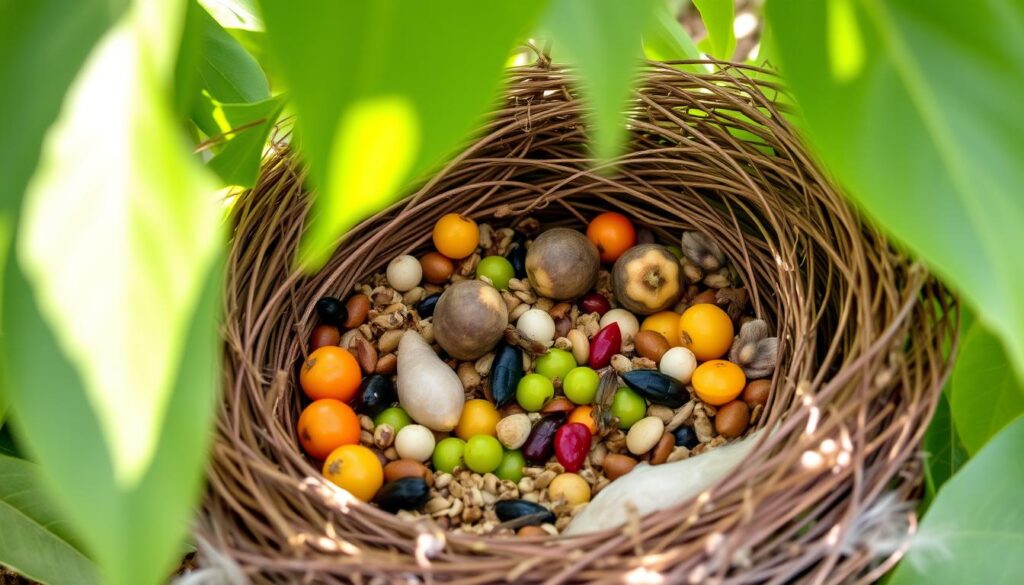
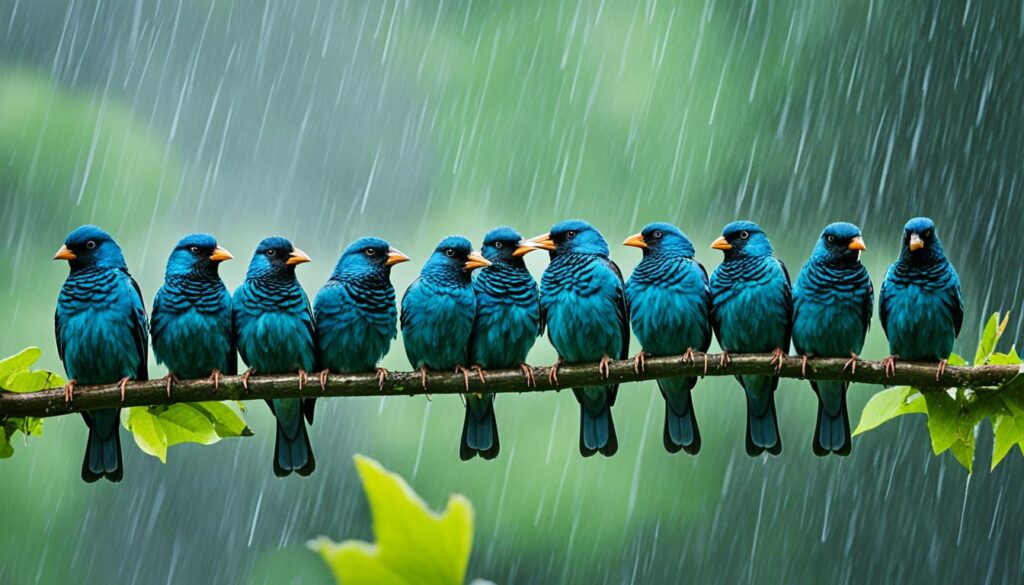
перепродажа аккаунтов https://birzha-akkauntov-online.ru/
маркетплейс аккаунтов профиль с подписчиками
гарантия при продаже аккаунтов купить аккаунт
биржа аккаунтов маркетплейс для реселлеров
профиль с подписчиками аккаунты с балансом
Account Catalog Online Account Store
Buy and Sell Accounts Sell accounts
Account trading platform Account trading platform
Gaming account marketplace Database of Accounts for Sale
Sell Pre-made Account Account Selling Service
Purchase Ready-Made Accounts Account Store
Account Exchange Service Sell accounts
Account Trading Platform Account Buying Service
Account Buying Service Account Selling Service
Account Acquisition Sell Pre-made Account
database of accounts for sale account sale
account exchange service verified accounts for sale
accounts market gaming account marketplace
website for buying accounts buy pre-made account
account market account store
account trading service account trading service
account catalog socialaccountsdeal.com
account selling platform buy account
secure account purchasing platform social media account marketplace
guaranteed accounts verified accounts for sale
account buying platform marketplace for ready-made accounts
online account store account exchange service
account exchange gaming account marketplace
buy pre-made account secure account sales
accounts for sale account acquisition
account sale account acquisition
website for buying accounts account acquisition
account trading service verified accounts for sale
sell pre-made account website for buying accounts
profitable account sales secure account sales
sell account secure account sales
account buying platform account acquisition
guaranteed accounts buy pre-made account
account sale verified accounts for sale
account acquisition account market
profitable account sales account exchange service
account purchase https://shop-social-accounts.org/
website for buying accounts https://accounts-offer.org
account marketplace accounts marketplace
account market https://social-accounts-marketplaces.live
account exchange service https://accounts-marketplace.live
ready-made accounts for sale https://social-accounts-marketplace.xyz
account trading platform https://buy-accounts.space/
account exchange service https://buy-accounts-shop.pro/
website for buying accounts https://buy-accounts.live
accounts for sale https://accounts-marketplace.online
website for buying accounts https://social-accounts-marketplace.live
website for buying accounts https://accounts-marketplace-best.pro
маркетплейс аккаунтов akkaunty-na-prodazhu.pro
биржа аккаунтов https://rynok-akkauntov.top
продажа аккаунтов kupit-akkaunt.xyz
купить аккаунт https://akkaunt-magazin.online/
маркетплейс аккаунтов купить аккаунт
продажа аккаунтов kupit-akkaunty-market.xyz
площадка для продажи аккаунтов маркетплейсов аккаунтов
купить аккаунт online-akkaunty-magazin.xyz
биржа аккаунтов https://akkaunty-dlya-prodazhi.pro
биржа аккаунтов купить аккаунт
buy facebook account buy facebook account
buy fb account buy facebook accounts
facebook ad account buy https://buy-ad-account.top
buy aged fb account https://buy-ads-account.click
buy facebook advertising accounts https://ad-account-buy.top
cheap facebook account https://buy-ads-account.work
buy a facebook ad account https://ad-account-for-sale.top
buy facebook accounts cheap facebook ad account buy
buying facebook account buy facebook account for ads
buy google ads invoice account https://buy-ads-account.top
buy google ads agency account buy google ads threshold account
buy facebook profiles https://buy-accounts.click
buy google ads threshold account https://ads-account-for-sale.top
buy google ads https://ads-account-buy.work
buy old google ads account https://buy-ads-invoice-account.top
buy google ads account google ads accounts
old google ads account for sale https://buy-ads-agency-account.top/